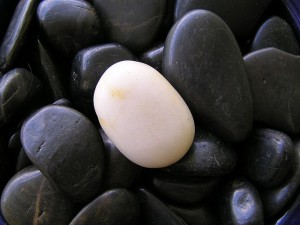
(Photo courtesy of Cyron at Flickr, CC License.)
Together with my students at a language course, I recently found a great way of activating det passive ordforrådet (the passive vocabulary). I wrote a simple word on tavlen (the blackboard), asking my students to find its motsetning (opposite). Then we picked another word, found its ”opposite”, and the game went on and on and on… The students were surprised how many words they knew! 🙂
Let’s play this game here on the blog. I’ll add only one translation, the other you’ll have to add in your mind!
god (good) – dårlig
sulten (hungry) – mett
tom (empty) – full
full (drunk) – edru
liten (small) – stor
dag (day) – natt
kvinne (woman) – mann
mørk (dark) – lys
hvit (white) – svart
her (here) – der
trist (sad) – glad
tung (heavy) – lett
enkel (easy) – vanskelig
ute (outside) – inne
ung (young) – gammel
tynn (thin) – tykk
å gråte (to weep) – å le
sunn (healthy) – usunn
fiende (enemy) – venn
krig (war) – fred
hat (hate) – kjærlighet
spørsmål (question) – svar
klok (knowledgeable, wise, clever) – dum
fjell (mountain) – dal
syk (ill) – frisk
farlig (dangerous) – trygg
vakker (beautiful) – stygg
varm (hot) – kald
kjedelig (boring) – gøy
å huske (to remember) – å glemme
…
Now, that isn’t too vanskelig, is it? 🙂 Many words have a ”twin” or a ”partner” that somehow is linked to it without being an actual opposite. Take for instance
hund (dog) – katt
å spise (to eat) – å drikke
å skynne seg (to hurry) – å vente
Do you agree with those? What are the opposites or ”partners” of
is (ice)
hav (sea)
ansikt (face)
fot (foot)
stillhet (silence)
kjøtt (meat)
å smile (to smile)
å prate (to talk)
furu (fir tree)
snø (snow)
?
Sometimes, words seem to come in sets of 3 or 4: pappa, mamma, barn (dad, mum, kids) – sol, måne, stjerne (sun, moon, star) – nord, sør, øst, vest (N, S, E, W) – øre, nese, øye, munn (ear, nose, eye, mouth). Maybe we could ”gamify” those sets as well…






Comments:
Alberto:
That was a neat tip, Bjørn! Thanks.
Bjørn A. Bojesen:
@Alberto @Alberto
You’re welcome! 🙂